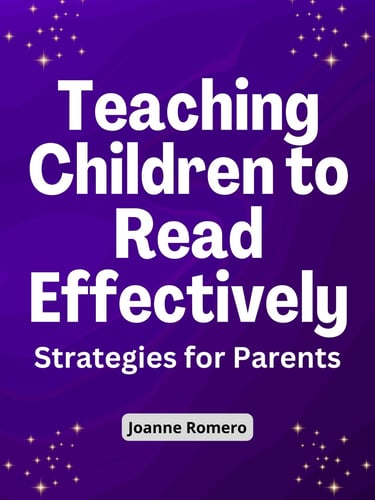10 Tips to Help Children Learn to Read Effectively
Helping your child learn to read is one of the most rewarding endeavors a parent or caregiver can undertake. Here are 10 great tips to help your child learn to read effectively.
EDUCATION
7/9/20243 min read
Disclaimer: The content provided in this article is for information purposes only. The author assumes no responsibility and shall have no liability whatsoever for your use or misuse of the information contained herein, or for any loss, damage or injury to your health in any way. This article does not recommend that you treat yourself without consultation from a licensed physician. By reading this article, you are agreeing to its disclaimer.
Introduction
Helping your child learn to read is one of the most rewarding endeavors a parent or caregiver can undertake, marked by its profound impact on a child's development and future. This journey into literacy does not merely equip children with the ability to decode letters and words; however, it opens the door to endless possibilities for learning, imagination, and exploration.
As children learn to read, they embark on adventures, discover new worlds, and begin to understand the complexities of the human experience through the stories and information they encounter. This process of learning to read is not just about literacy, it's about nurturing a lifelong love of learning, curiosity, and creativity.
The act of teaching a child to read is a deeply interactive and bonding experience, fostering a sense of trust and support between child and caregiver. It involves patience, consistency, and the tailored understanding of a child's unique learning pace and preferences.
Through shared reading sessions, engaging storytelling, and the exploration of diverse materials, parents and caregivers can ignite an enthusiasm for reading that transcends the classroom. This personalized approach not only aids in the development of reading skills but also instills confidence and a sense of achievement in young learners.
Moreover, the benefits of learning to read early in life are wide-ranging and impactful. Literacy enhances cognitive development, improves concentration, and promotes better academic performance across all subjects.
Beyond the academic advantages, reading cultivates empathy and emotional intelligence, as children learn about different cultures, perspectives, and experiences. In essence, by investing time and effort into helping your child learn to read, you are opening up a world of opportunity, knowledge, and imagination that will serve them throughout their lives, making it a truly invaluable gift.
10 Tips to Help Children Learn to Read Effectively
Here are 10 tips to help children learn to read more effectively:
Start Early: Introduce books and reading as early as possible, even before they can read independently. Reading to them fosters a love for stories and language.
Make it Fun: Use interactive and engaging methods like story-telling, using puppets, or acting out parts of a book to make reading enjoyable.
Create a Reading Routine: Establish a regular reading time each day. Consistency helps children associate reading with a daily habit.
Choose Age-Appropriate Books: Select books that match their reading level and interests. This keeps them engaged and motivated to read.
Encourage Phonics: Teach phonics early on to help children understand the relationship between letters and sounds, which is crucial for decoding words.
Use Reading Tools: Utilize tools like flashcards, phonics apps, or word games that reinforce reading skills in a playful manner.
Be Patient and Supportive: Encourage them to read at their own pace. Offer praise and positive reinforcement to boost their confidence.
Create a Reading Space: Dedicate a quiet, comfortable space for reading. Having a cozy environment can enhance focus and concentration.
Discuss What They Read: Engage in discussions about the story, characters, and plot. This improves comprehension and critical thinking skills.
Lead by Example: Let children see you reading regularly. Being a role model reinforces the importance and enjoyment of reading.
By incorporating these tips into daily routines and activities, you can help children develop strong reading skills and a lifelong love for books.
To get information about 20 essential strategies parents can utilize in helping their children learn to read effectively, click the link or image below
If you have questions or concerns, you may contact us at: ebooks@cleomijo.com or use the form below:



